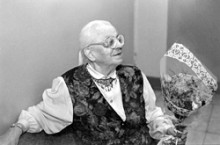She was called a Cossack guardian angel. Whoever first said this status about Olena Apanovych was right. She was the first woman, an outstanding Ukrainian historian, to enter the Zaporozhzhian sich (Cossack fortress destroyed by Russian Empress Catherine II in the eighteenth century — Ed.), violating the old taboo that on pain of death no woman could set foot there, by publishing her famous book The Armed Forces of Ukraine.
She marked her eightieth birthday half a year ago, so very recently, rejoicing in the publication of a bibliographic handbook summing up her rich scholarly heritage. She was still in her creative prime. The Day’ (No. 37, October 5, 1999) carried an article on this extraordinary woman. It was all so very recently. And now this author has the mournful task of writing an obituary of the late Olena Apanovych.
The past decade saw her at the peak of her creative and scholarly glory. It was as though Fate had second thoughts about Olena Apanovych’s earlier hardships and at last smiled on her, bestowing on her all that which had been denied her during the previous decades of persecution she had suffered from both Soviet authorities and colleagues. Fifty years under the sign of Clio is the measure of Apanovych’s lifetime achievement. She was a Taras Shevchenko Prize laureate and recipient of the prestigious Antonovych Foundation Prize (USA). Those fifty years embraced 366 published works, not counting the manuscripts she was in such a hurry to finish while instantly being inspired by new projects and ideas. Hopefully, her multivolume Cossack Encyclopedia for Young People and reminiscences about the renowned historian Fedir Shevchenko will still appear in print, especially since these works shed much light on Olena Apanovych’s life and times.
She lived as though singing an endless song, wondrously light and beautiful, belying the infirmities and other problems imposed by age, and the hardships of those terrible repressive times. In her last months she was busy developing a philosophy of one day; she was learning to live one day at a time, without making any plans for the morrow, saying she could accomplish more that way. Old age, with its attendant anemia and senility, did not befit her. She was always vigorous, inspired, expressive, and quick-witted in all situations. And she remained invariably feminine. I shall always remember Olena Mykhailivna as a woman with boundless enthusiasm her calling and ones invariably sensitive to others’ gains and failures. I shall always remember our four to five hour conversations covering all sorts of topics, her lessons in wisdom and love — no, it was more — the thirst for life and an ability to raise oneself above all difficulties, differences, and grudges. She never forgot to apologize as soon as she realized that she had been wrong.
As is so often the case, someone we love and respect so dearly, is suddenly no longer among the living. And we feel guilty without knowing why. It is as though we should have talked something over with that person, discussing something so very important to us all. We had put off that discussion time and again, until we discovered it was too late.
Olena Apanovych departed in her own very graceful and noble manner. She has forsaken us for Eternity, leaving her near and dear, all her friends and admirers untouched by negative emotions and unnecessary pain. It was as though she has merely stepped away from us, vanishing into the darkness of time.







